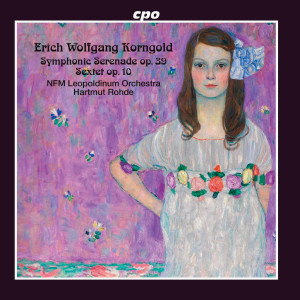
ESSENTIAL RECORDINGS

Symphonic Serenade in B-Flat Major, Op. 39 String Sextet in D Major, Op. 10 (arr. H. Rohde for string orchestra)
Erich Wolfgang Korngold (1897-1957) has often been pigeon-holed as a composer of film scores, detrimental to the idea that he was first and foremost a de facto composer of great aptitude, admired for showing much promise at a young age by Gustav Mahler and Richard Strauss amongst others. True, he did write formidable cinematic scores during the Golden Age of Hollywood for such films as The Sea Wolf, Captain Blood, The Adventures of Robin Hood, Of Human Bondage, etc ... primarely to earn a living after moving from Austria to the United States in 1934 to escape the Nazi regime. But prior to that he had already written a ballet at the age of eleven, composed a few operas including the highly admired Die tote Stadt, and been a music professor at the Vienna State Academy. One need only hear his magnificent Violin Concerto to perceive this composer's potential.
The Lento religioso movement alone, from the Symphonic Serenade in B-Flat Major, a work for string orchestra written entirely from scratch in his head while he was in hospital recovering from a major heart attack, is well worth the price of admission. On first hearing, I found it to be highly redolent of Gustav Mahler's Adagio from the 10th Symphony, and then unsurprisingly read this line in the booklet notes: "Here, the key influence must surely be Korngold's childhood mentor, Gustav Mahler." Anguish, passion, and sorrow captured in a rich harmonic palette. Although written in 1948, it definitely harks back to the hyper-romantic years of the late 19th century, stretching harmony to its breaking point. Conductor Hartmut Rohde and the NFM Leopoldinum Orchestra well project its impassioned intensity.
The NFM (National Forum of Music) Leopoldinum Orchestra, founded as recently as 1978, could be considered a young ensemble on many accounts, including the booklet's photograph which has them posing as if part of a shoot for a fashion show. But their level of musicianship belies this marketing perspective. The warmth of expression they convey, especially within the aforementioned Lento religioso is quite remarkable and highly effectual at exposing the music's core intent. Recommended!
Jean-Yves Duperron - January 2022